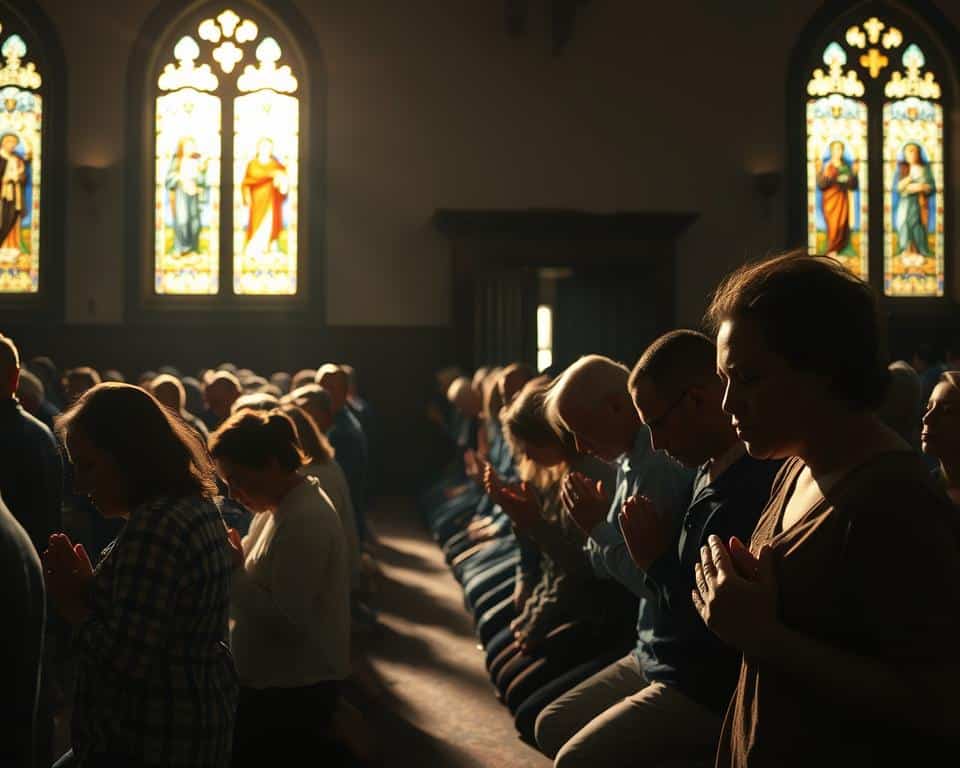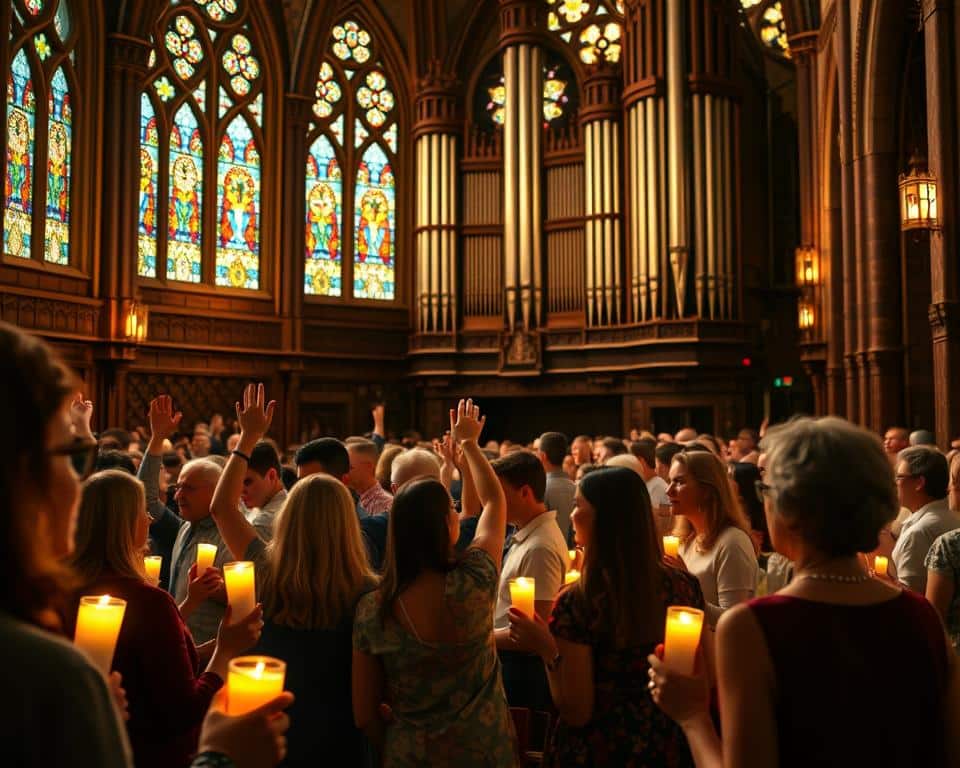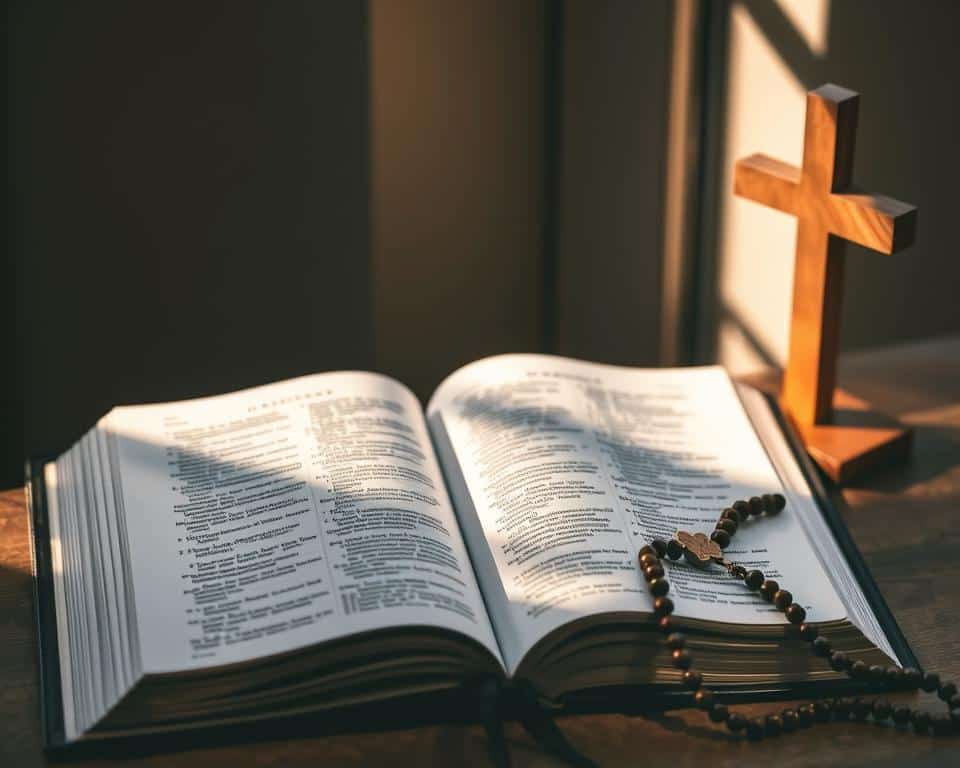“Worship is the submission of all our nature to God. It is the quickening of conscience by His holiness…” — C.S. Lewis. These words remind us that true worship isn’t about circumstances—it’s about faith in who God is.
Life brings storms, but worship anchors the heart. The Bible shows powerful examples—like Paul and Silas praising God in prison (Acts 16:25) or Job blessing the Lord despite unbearable loss. Their faith wasn’t based on outcomes but on God’s unchanging character.
Worship is an act of trust, not a reaction to answered prayers. Psalm 34:1 says, “I will bless the Lord at all times.” This means praising Him not just when life is easy, but because He remains good, no matter what.
Your trials don’t define God’s love. Instead, they reveal where your faith is rooted. Will you lean into His promises? Let Scripture guide you. His word is steady when everything else shakes.
Why Worship Matters in Hard Times
God’s love shines brightest when circumstances feel darkest. Worship isn’t about ignoring pain—it’s about fixing your eyes on the One who never changes. Like a compass in a storm, it points you back to truth.
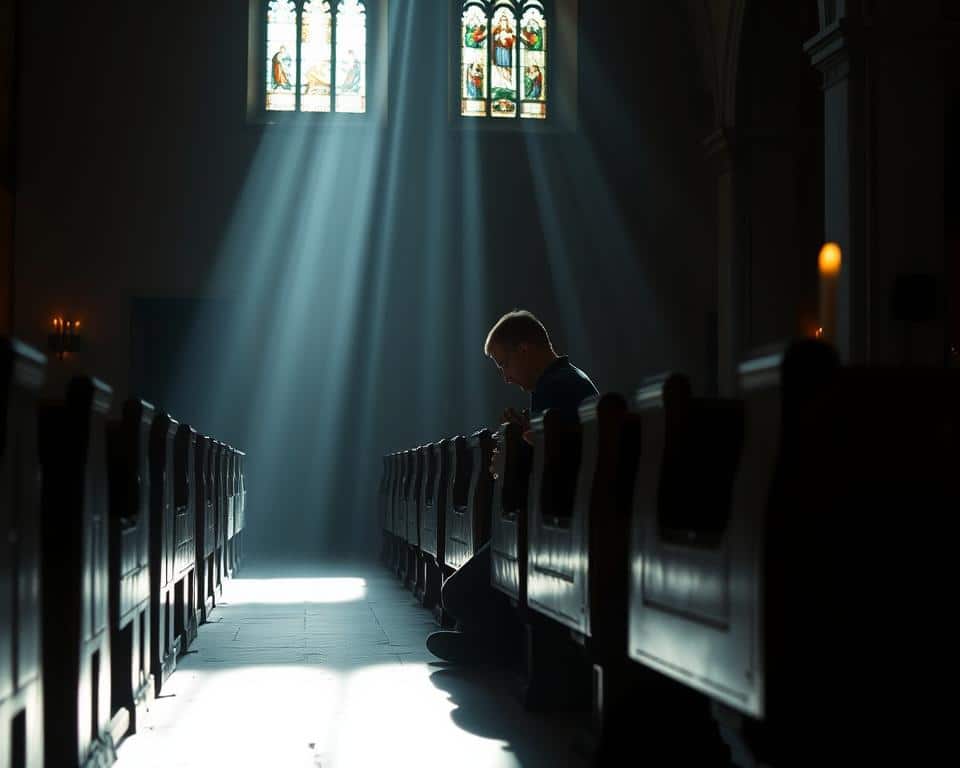
Worship reframes struggles. It reminds you that today’s trials are temporary, but God’s promises are eternal. The Psalmist wrote:
“For the Lord is good; His steadfast love endures forever”
(Psalm 100:5). His love outlasts every hardship.
Trials aren’t punishment—they’re tools. Just as fire purifies gold, tough seasons refine faith. King David’s psalms show this: even in danger, he praised God’s faithfulness. His worship turned fear into trust.
Emotions lie. Fear shouts, “God has forgotten you!” But Scripture whispers, “I have engraved you on the palms of My hands” (Isaiah 49:16). Worship silences doubt by declaring God’s truth louder than your feelings.
When discouragement knocks, worship locks the door. It protects your identity as God’s child. Like Job, you can say, “Though He slay me, yet will I hope in Him” (Job 13:15). That’s the power of loving God in the fight.
Biblical Examples of Worship in Trials
Scripture shows us powerful moments where faith overcame fear. When pain pressed in, God’s people responded with praise—not because their circumstances changed, but because He never does. Their stories remind us: worship isn’t a last resort; it’s a first response.
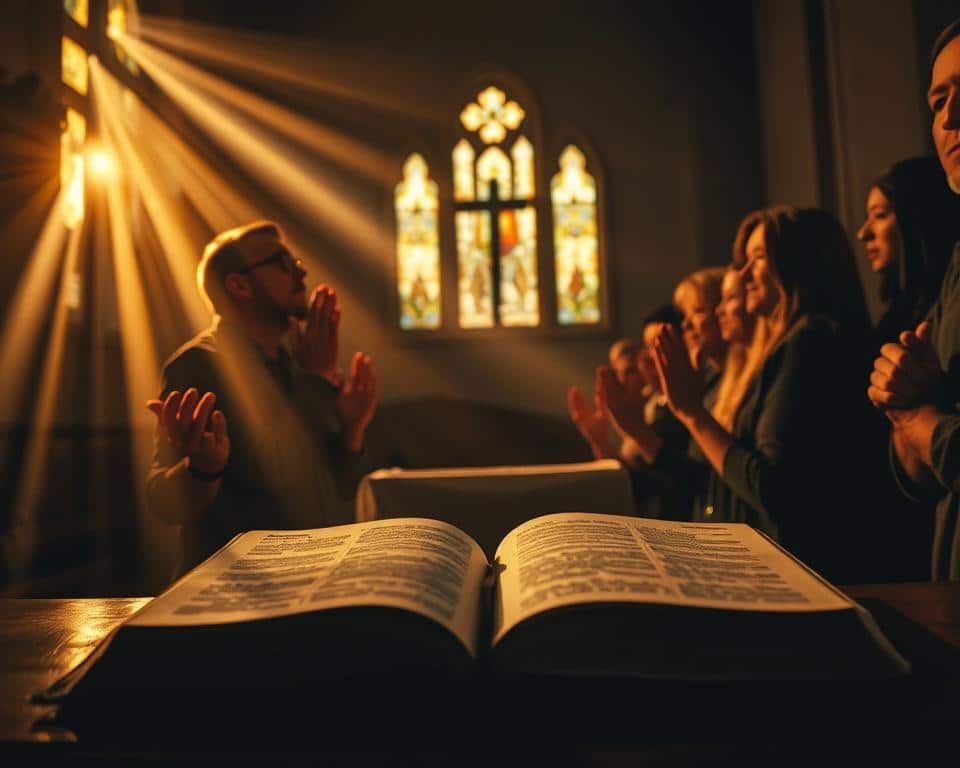
Paul’s Praise from Prison
Chained in a dungeon, Paul and Silas sang hymns at midnight (Acts 16:25). Their jailers heard joy, not complaints. They didn’t wait for freedom to worship—they trusted God’s plan even in the dark. Their song became a testimony: faith thrives where hope seems impossible.
Jesus’ Prayer in Gethsemane
Facing the cross, Jesus prayed,
“Not my will, but Yours be done”
(Luke 22:42). Agony didn’t diminish His surrender. Instead, His obedience magnified God’s glory. When your heart aches, follow His example: honesty before God leads to peace beyond understanding.
Job’s Faith Amid Loss
After losing everything, Job declared,
“The Lord gave, and the Lord has taken away; blessed be the name of the Lord”
(Job 1:21). His worship wasn’t denial—it was defiance against despair. Like Job, you can bless God even when life hurts. His love outlasts every loss.
Habakkuk 3:17–18 sums it up: “Though the fig tree should not blossom… yet I will rejoice in the Lord.” These heroes didn’t have all the answers. But they knew the One who did. Let their stories fuel your faith today.
Worshipping During Trials: A Sign of Mature Faith
Faith isn’t tested when life is easy—it’s proven in the fire. Maturity means trusting God’s character more than visible results. Like Job, you might not understand the “why,” but you can cling to the “Who.”
“Count it all joy when you meet trials… for testing produces steadfastness.”
Joy here isn’t about smiling through pain. It’s the quiet confidence that God is working even when you can’t see it.
Infant faith demands comfort. Mature faith seeks purpose. Think of a runner: early training hurts, but each mile builds endurance. Spiritual muscles grow through resistance. Your trials aren’t setbacks—they’re strength training.
Romans 5:3–5 maps the journey: Suffering → endurance → character → hope. God never wastes pain. He uses it to shape you into someone unshakable.
Worship God even when life feels heavy. It’s not denial; it’s defiance against despair. True peace comes from His presence, not perfect circumstances. Rest there. Let your faith be refined, not ruined.
Practical Ways to Worship When Life Hurts
When pain feels overwhelming, worship shifts your focus from problems to God’s promises. You don’t need perfect words—just a heart turned toward Him. Here are three powerful ways to worship God even when tears fall.
1. Remember God’s Past Faithfulness
Recall how He’s carried you before. Like Julian Panga, who survived a train accident by trusting God’s past deliverance, your history with Him fuels hope.
- Journal 3 times God answered prayer (Psalm 69:29–30).
- Speak aloud: “You were faithful then; You’ll be faithful now.”
2. Lean on the Holy Spirit
Confused? The Holy Spirit guides you (John 14:26). Try breath prayers: inhale “Spirit,” exhale “fill my weakness.” Simple, but powerful.
- Repeat short prayers throughout the day.
- Ask Him to bring Scripture to mind when fear rises.
3. Speak Truth Over Your Circumstances
Fear shouts lies. Worship God by declaring His Word louder. Stand on verses like 2 Timothy 1:7: “God gave us a spirit of power, not fear.”
“Why are you cast down, O my soul? Hope in God!”
Play worship music (Ephesians 5:19). Singing truths rewires your thoughts. Let praise be your weapon.
How Trials Reveal God’s Power
Trials don’t hide God’s strength—they reveal it. When you feel weakest, His power works best. Like Paul wrote:
“My grace is sufficient for you, for My power is made perfect in weakness.”
God often strips away human strength to showcase His own. Take Gideon’s army: reduced to 300 men so Israel wouldn’t boast, “Lest they claim glory for themselves” (Judges 7:2). Victory came not through numbers but through God’s strategy. His power thrives where ours ends.
Modern faith echoes this. A cancer survivor once shared: “My healing wasn’t instant, but every scan showed God’s faithfulness.” Even unanswered prayers deepen reliance. When Jesus didn’t remove Paul’s thorn, He proved something greater: His presence outweighs our comfort.
Here’s the paradox:
- Human limits + God’s power = unstoppable faith.
- Your trials aren’t about your ability—they’re about His sufficiency.
Fear whispers, “You’re not enough.” God answers, “I AM.” Let your weakness point to His strength. That’s where true power shines.
The Role of Community in Sustaining Worship
You weren’t meant to face hardships alone—God designed faith to thrive in community. Like the early church in Acts 2:42, believers grow stronger when they pray, eat, and worship together. Isolation magnifies pain, but shared burdens lighten the load.
Trials lose their power when others stand with you. Small groups create accountability, turning solitary struggles into collective praise. “Carry each other’s burdens,” Paul urges in Galatians 6:2. A text, a hug, or a shared Scripture can reignite hope.
Corporate worship anchors hearts to truth. Singing hymns with others shifts focus from problems to God’s promises. Research shows group singing reduces stress—proof that God’s design for community heals.
Tangible love sustains faith. Meal trains during crises mirror Jesus feeding the 5,000—a way to say, “God sees you.” Testimony nights remind everyone: His faithfulness outlasts every trial.
When Julian faced depression, his church’s prayers became his lifeline. Your story, shared, might steady someone else. Together, we worship not because life is easy—but because God is good.
Trusting God’s Purpose in Your Pain
What if your deepest hurt is shaping your greatest strength? Pain often feels random, but Scripture shouts otherwise. God never wastes a thing. Romans 8:28 promises He works all things for good—even the broken pieces.
Job asked “Why me?” God answered with a whirlwind (Job 38–42). Not explanations, but a reminder: “I AM sovereign.” Your trials aren’t punishment. They’re part of a bigger story—like Joseph’s betrayal leading to redemption (Genesis 50:20).
God’s will has two layers:
- Perfect will: His ideal plan (no sin, no pain).
- Permissive will: His ability to redeem our choices.
Your pain might not be His first desire, but He’ll use it for purpose.
Surrender timelines. Proverbs 3:5–6 says, “Trust in the Lord… He will direct your paths.” Like a father guiding a child, God sees the full map. Your waiting season isn’t wasted—it’s preparation.
“You intended to harm me, but God intended it for good.”
Genesis 50:20
Try this: Write a Letter to Your Future Self. Note today’s struggles, then list truths about God’s character. Re-read it later. You’ll see growth only visible in hindsight.
Control is an illusion. But your Father holds every detail. Trust Him—not because the path is clear, but because His love never fails.
Let Worship Be Your Anchor
Heaven’s hope outshines earth’s hardest moments. Revelation 21:4 reminds us: “He will wipe every tear away.” Fix your eyes there. Today’s struggles are temporary, but God’s truth stands forever.
Try the ACTS prayer model: Adore God for who He is. Confess what weighs you down. Thank Him for past faithfulness. Ask for today’s needs. Simple, but powerful.
Set daily “worship alarms”—3-minute pauses to refocus. Play a hymn, whisper Scripture, or list blessings. Like C.S. Lewis wrote: “Hard pressed on every side, but not crushed.” Small acts of praise shift perspectives.
May the Lord bless you and keep you (Numbers 6:24–26). Let worship anchor your soul—not because life is easy, but because God is good. Always.
FAQ
Why is worship important when facing hard times?
Worship shifts your focus from problems to God’s power. It reminds you of His love, control, and promises, bringing peace even when life feels overwhelming.
How can I praise God when I don’t feel like it?
Start by recalling His faithfulness in your past. The Holy Spirit strengthens weak hearts—ask Him for help. Even small acts of trust honor God.
What Bible figures worshipped during suffering?
Paul sang in prison (Acts 16:25), Jesus surrendered to the Father’s will in Gethsemane (Luke 22:42), and Job praised God after losing everything (Job 1:20-21).
Does worship during trials mean ignoring pain?
No. Authentic worship acknowledges hurt but chooses to trust God’s purpose. It’s honesty wrapped in hope, not denial.
How can community help me worship in tough seasons?
Fellow believers offer strength when yours falters. Their prayers, Scripture reminders, and presence help you see God’s light in darkness.
What if my trial doesn’t end—how do I keep worshipping?
Focus on God’s presence, not just outcomes. Like David in the Psalms, pour out your heart, then reaffirm His goodness daily.

